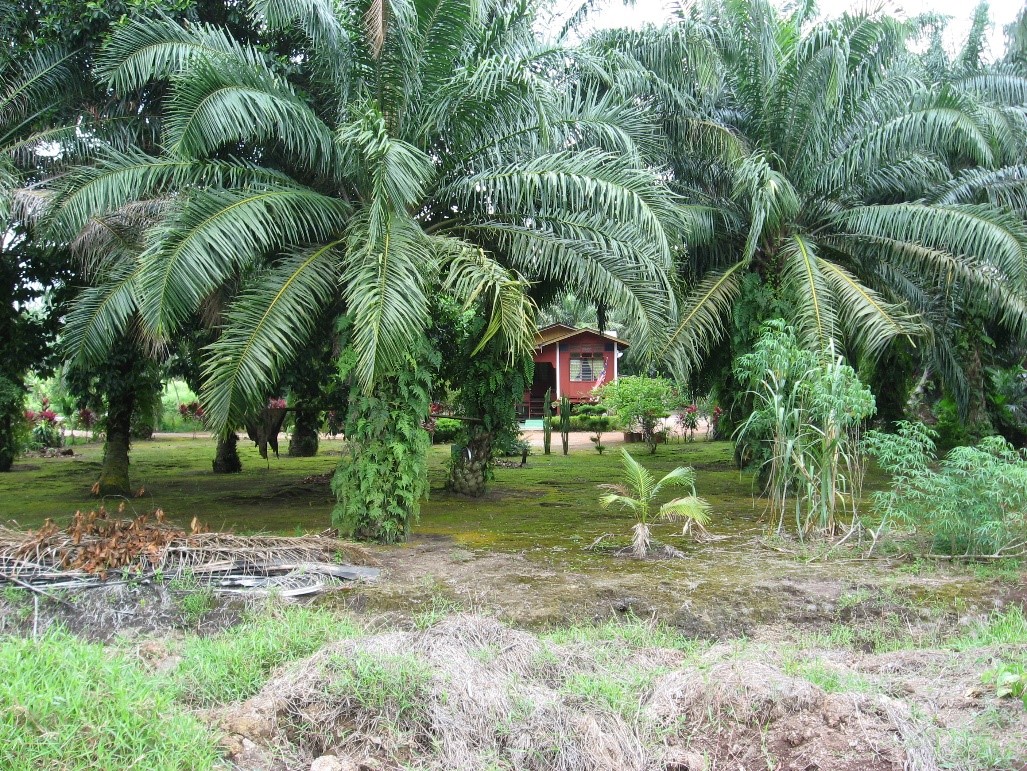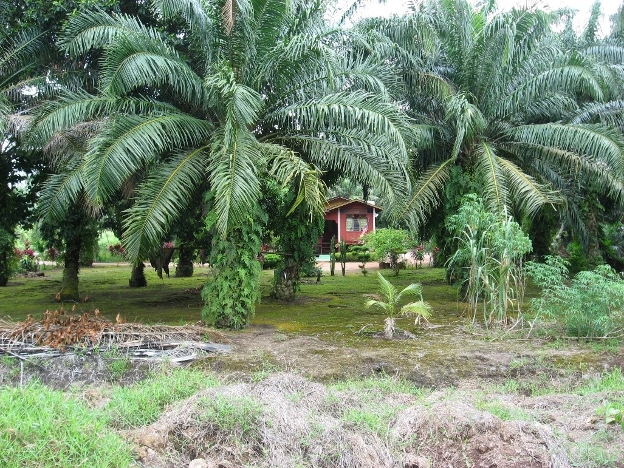Cookies
Van Hall Larenstein treats its customers' information with the utmost care and will never make this information available to third parties. Read more about us Privacy and Cookie Policy

Tropical rainforests are crucial ecosystems on our planet. They play a major role in regulating climate through processes such as CO2 sequestration, oxygen production and water retention. They also provide a habitat for more than 30 million plant and animal species (80% of all terrestrial flora and fauna in the world) and are a source of wood and other products for local, national and international markets. The benefits provided to humans by ecosystems such as tropical rainforests are sometimes referred to as ecosystem services. Unfortunately, rainforests have suffered from high levels of deforestation and degradation over the past few decades, mainly due to the expansion of agricultural land and forest exploitation. The palm oil industry has also grown enormously, leading to extensive deforestation and associated problems.
Palm oil is the most commonly used vegetable oil in the world, and 85% of it is produced in Indonesia and Malaysia. However, boycotting oil palm plantations isn’t the solution. Oil palm actually yields four times as much oil per hectare as the second most common variety (rapeseed), so switching to an alternative would just increase rates of deforestation. This suggests the need for a holistic approach, whereby efforts to sustainably conserve and manage the ecosystems provided by tropical rainforests take account of both ecological and socio-economic issues.
The Oil Palm and Tropical Forests applied research group focuses on the sustainable use of ecosystem services provided by tropical rainforest regions. The group looks at the ecological sustainability of oil palm plantations as well as the sustainable use of tropical rainforest regions, including strategies for monitoring and preventing deforestation.
Professor Peter van der Meer completed a degree in Tropical Forestry at Wageningen University & Research in 1988, followed by PhD research into the natural regeneration of tropical rainforests in French Guyana. He then spent 3½ years in Australia, working on the sustainable management of indigenous eucalyptus forests. In 1999 he joined Wageningen University & Research as a researcher in international forest and nature management. He has worked as a project leader for forestry research in Malaysia (Sarawak), China, India, Indonesia, Suriname and Mozambique. He joined Van Hall Larenstein University of Applied Sciences (HVHL) in 2014 as the coordinator of the Tropical Forestry specialisation (part of the Forest and Nature Management study programme). Since 2017 he has also been involved with the MSc in Agricultural Production Chain Management, as coordinator of the Forest Chain specialisation. He has been a part-time associate professor in oil palm and tropical forests since September 2018.
research into the natural regeneration of tropical rainforests in French Guyana. He then spent 3½ years in Australia, working on the sustainable management of indigenous eucalyptus forests. In 1999 he joined Wageningen University & Research as a researcher in international forest and nature management. He has worked as a project leader for forestry research in Malaysia (Sarawak), China, India, Indonesia, Suriname and Mozambique. He joined Van Hall Larenstein University of Applied Sciences (HVHL) in 2014 as the coordinator of the Tropical Forestry specialisation (part of the Forest and Nature Management study programme). Since 2017 he has also been involved with the MSc in Agricultural Production Chain Management, as coordinator of the Forest Chain specialisation. He has been a part-time associate professor in oil palm and tropical forests since September 2018.
Sustainability of Palm Oil Plantations
The debate around palm oil and sustainability has been going on for a number of years. On the one hand, palm oil production provides an unprecedented opportunity for the agro-food industry and for local farmers in tropical countries. On the other hand, environmental groups and local civil society groups protest against the severe environmental impacts and the infringement of land rights. Through the SEnSOR (Socially and Environmentally Sustainable Oil Palm Research) project, we’re working with partners in the UK, Malaysia and Indonesia to improve the criteria and indicators for sustainable palm oil. This will give buyers of palm oil greater certainty that what they’re buying has genuinely been grown in a sustainable manner. The project, which launched in 2015, has produced a series of background documents for the Roundtable on Sustainable Palm Oil (RSPO). These can be downloaded from our website (http://www.sensorproject.net/) and are used by stakeholders in the palm oil industry, NGOs and government policymakers. We also advise the RSPO on formulating improved guidelines for the certification of small-scale palm oil farmers.

Reforestation in Ghana
Ghana has lost a large proportion of its tropical forests over the past few decades. The deforested regions have suffered heavy erosion and biodiversity loss, and they no longer provide a livelihood for local populations. In 2016 we started providing training to the middle management of a teak plantation in the north-east of Ghana. The training focuses on improving knowledge and awareness of issues such as tree planting, tackling forest fires, monitoring, and managing the plantations. As a result of the project, the plantation has better trained staff who are more conscious of their important role in properly managing the plantation and the surrounding region. The planting of teak trees and the creation of green buffer zones has made the whole region greener, which has improved biodiversity and provided employment to the local population. More than 1,000 local workers are now employed at the plantation, and initiatives are underway in the surrounding region to expand the green area with other kinds of fruit trees.

The applied research group includes a wide range of people. We work collectively on the projects and challenges set by the group. This knowledge network consists of:
Within HVHL we work with other applied research groups such as the Management of Forested Landscapes group. The applied research group works closely with the following study programmes:
If you have any questions about the applied research group, please email [email protected]